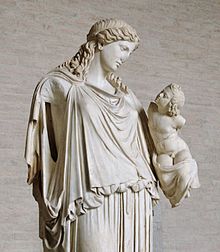| Revision as of 22:21, 26 April 2010 edit173.56.110.145 (talk)No edit summary← Previous edit | Revision as of 22:31, 26 April 2010 edit undo173.56.110.145 (talk)No edit summaryNext edit → | ||
| Line 1: | Line 1: | ||
| ]: Roman copy after ]' votive statue, c. 370BCE, in the Agora, Athens]] | ]: Roman copy after ]' votive statue, c. 370BCE, in the Agora, Athens]] | ||
| '''Eirene''', or '''Irene''' ({{lang-grc|Εἰρήνη}}, pronounced {{IPA-all|eiˈrɛːnɛː}}; Greek for "peace" |
'''Eirene''', or '''Irene''' ({{lang-grc|Εἰρήνη}}, pronounced {{IPA-all|eiˈrɛːnɛː}}; Greek for "peace". Zeus lay with the titan Themis, who was also his aunt and whose name means "the laws of nature" and fathered the Hours. Their name signifies maturity and ripeness, the appropriate moment in time. And it was they,who, as the seasons of the year, brought fruits of the earth. They were beautiful, and lived on Mount Olympus alongside Zeus. They danced, sang and robed Aphrodite. Their names were Eunomia, Dike and Irene, and according to Hesiod, they protected the works of men. | ||
| Thus, apart from being goddesses of verdent growth and fertility, as their names indicate they represent social and political order. | |||
| == External links == | == External links == | ||
| {{commonscat|Eirene}} | {{commonscat|Eirene}} | ||
| * | * | ||
| <ref>Insert footnote text here</ref> | |||
| {{Greek-deity-stub}} | {{Greek-deity-stub}} | ||
| <gallery> | |||
| Image:Example.jpg|Caption1 | |||
| Image:Example.jpg|Caption2 | |||
| </gallery> | |||
| ] | ] | ||
Revision as of 22:31, 26 April 2010

Eirene, or Irene (Template:Lang-grc, pronounced IPA: [eiˈrɛːnɛː]; Greek for "peace". Zeus lay with the titan Themis, who was also his aunt and whose name means "the laws of nature" and fathered the Hours. Their name signifies maturity and ripeness, the appropriate moment in time. And it was they,who, as the seasons of the year, brought fruits of the earth. They were beautiful, and lived on Mount Olympus alongside Zeus. They danced, sang and robed Aphrodite. Their names were Eunomia, Dike and Irene, and according to Hesiod, they protected the works of men. Thus, apart from being goddesses of verdent growth and fertility, as their names indicate they represent social and political order.
External links
This article relating to a Greek deity is a stub. You can help Misplaced Pages by expanding it. |
- Insert footnote text here
